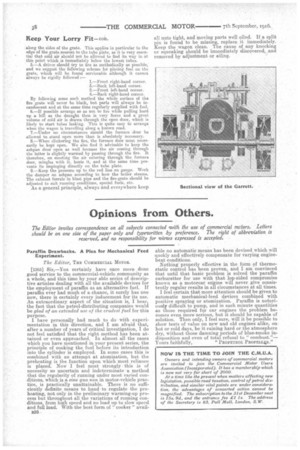Opinions from Others.
Page 18

If you've noticed an error in this article please click here to report it so we can fix it.
The Editor invites correspondence on all subjects connected with the use of commercial motors. Letters should be on one side of the paper only and typewritten by preference. The right of abbreviation is reserved, and no responsibility for views expressed is accepted.
Paraffin Drawbacks. A Plea for Mechanical Feed Experiment.
The Editors THE COMMERCIAL MOTOR.
[1385] Sir,—You certainly have once more done good service to the commercial-vehicle community as a whole, and this time by your able series of descriptive articles dealing with all the available devices for the employment of paraffin as an alternative fuel. If paraffin ever had much of a chance, it surely has one now, there is certainly every inducement for its use. An extraordinary aspect of the situation is, I hear, the fact that the petrol-distributing companies would be glad of an extended use of the crudest fuel for this purpose.
I have personally had much to do with experimentation in this direction, and I am afraid that, after a number of years of critical investigation, I do not feel satisfied that the right method has been attamed or even approached. In almost all the cases which you have mentioned in your present series, the principle of cooking the fuel before its introduction into the cylinder is employed. In some cases this is combined with an attempt at atomization, but the preheating is the function upon which most reliance is placed. Now I feel most strongly this is of necessity so uncertain and indeterminate a method that the regularity of running under most varied conditions, which is a sine qua non in motor-vehicle practice, is practically unattainable. There is no sufficiently definite means to hand to regulate the prehea,ting, not only in the preliminary warming-up process but throughout all the variations of running conditions, from high speed and no load up to slow speed and full load. With the best form of " cooker " avail
3358 able no automatic means has been devised which will quckly and effectively compensate for varying enginebeat conditions.
Nothing properly effective in the form of thermostatic control has been proven, and I am convinced that until that basic problem is solved the paraffin carburetter for use with that lop-sided compromise known as a motorcar engine will never give consistently regular results in all circumstances at all times.
I feel certain that more attention should be given to automatic mechanical-feed devices combined with positive spraying or atomization. Paraffin is notoriously difficult to pump, and in such minute quantities as those required for car engines the problem be• comes even more serious, but it should be capable of solution. Then only, I feel sure, will it be possible to show tests of value on new and old engines alike, on hot or cold days, be it raining hard or the atmosphere dry, without those damning periods of blue-smoke indisposition and even of totalrefusal to " combust"— Yours faithfully, "PROPETROL PROPELLV."




















